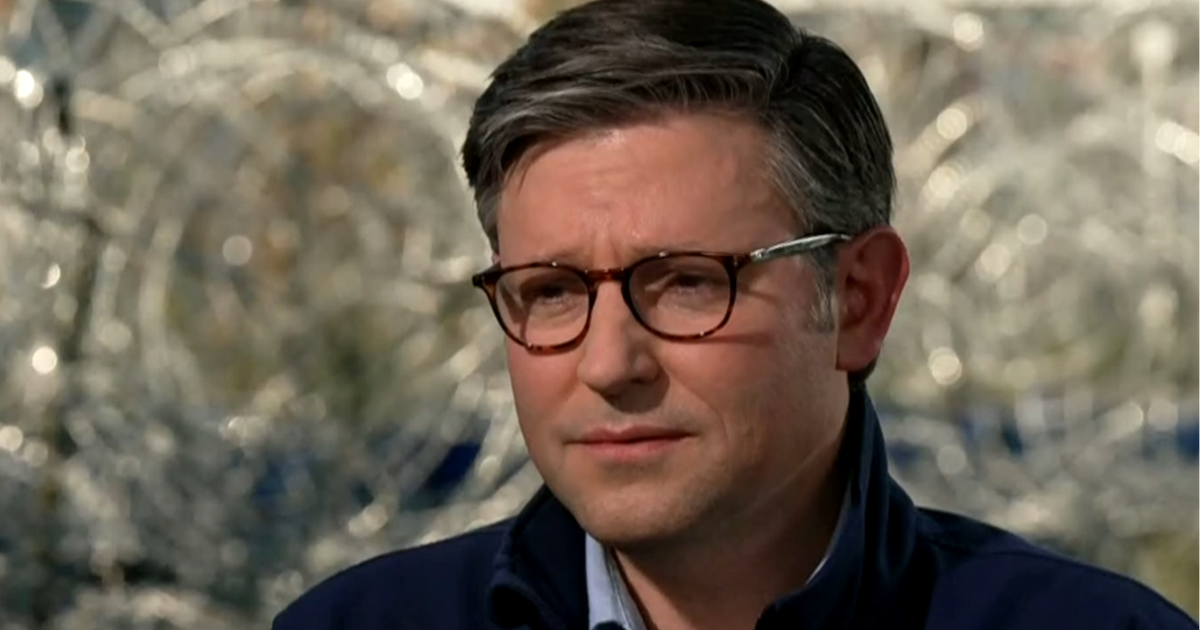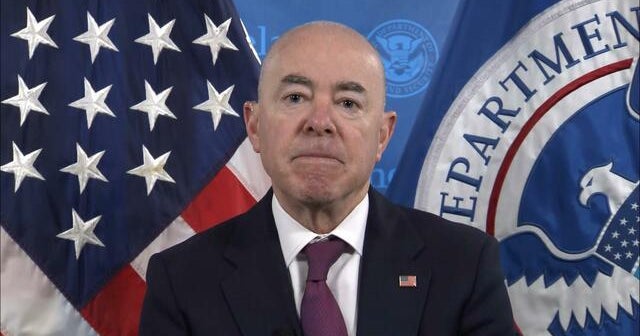Transcript: Sen. Lindsey Graham on "Face the Nation," Dec. 31, 2023
The following is a transcript of an interview with Sen. Lindsey Graham, Republican of South Carolina, that aired on Dec. 31, 2023.
MARGARET BRENNAN: And we're going to turn now to one of those negotiators involved in the talks, that is Republican Senator Lindsey Graham, who is with us from Seneca, South Carolina. Senator, welcome back to the program.
SENATOR LINDSEY GRAHAM: Thank you.
MARGARET BRENNAN: You just heard laying out for you all the incredible things that are now being considered in this proposed deal. They seem significant. Do you think that you and the Republicans involved in this negotiation can get the party to sign on?
SEN. GRAHAM: Well, I hope so. We need- we need to do it, not only for Ukraine, but for our own national security. I look at the border problems as a national security nightmare for America. The threats to America are at an all time high from jihadist groups, we have a broken border, 300,000 People in December alone up about 400% from 20- from 2020. Here's the key I think. We're asking the administration to use Title 42 type authority to tell people we're full. It takes four years to get your asylum claim heard, we have 1.7 million people who are ready to be deported, but they just won't deport them. We need to send some people out of the country to stop the inflow, but Title 42 authority in the hands of any administration willing to use it would stop this. When you come to our border. We say I'm sorry, we're full.
MARGARET BRENNAN: Well, at what number would you institute this? And just to be clear, this would allow for the expulsion of migrants without an asylum hearing?
SEN. GRAHAM: At zero.
MARGARET BRENNAN: I'm sorry.
SEN. GRAHAM: Okay, here's what- Yes, okay, we turn people back because of COVID. We have a pandemic in the country. Our system is broken, you're gonna have mayor's talking about more money to help relocate migrants. We're not gonna have a remain in Texas policy. I don't know if Abbott will win in court having a state law to deal with this. I don't know if he will or not, but he's a desperate man trying to protect his state. So to the mayor's, call up the White House and say, We're Republicans to change asylum, change parole, but implement a Title 42 authority that would stop the inflow. We're full. Don't come.
MARGARET BRENNAN: We'll talk to the mayor's about that. They are actually asking the Biden administration for help. But- But are you suggesting here that there isn't yet agreement on expulsion authority in your group of negotiators?
SEN. GRAHAM: There's- there's, I am telling you right now, expedited removal is on the table. They want more exceptions to make the rule almost meaningless. We're having to pull teeth to change policy. This is not irregular migration. That's a bunch of BS. This is a predictable outcome of bad policy choices made right after Biden became president. We all said if you do a remain in Mexico, you're going to have a run on the border-
MARGARET BRENNAN: Well you know, the Supreme Court got involved in that and that's complicated with the Mexican government too but–
SEN. GRAHAM: No. It's not complicated.
MARGARET BRENNAN: Well, in the past-
SEN. GRAHAM: No. It's not complicated.
MARGARET BRENNAN: You suggested in interviews that parole was a sticking point specifically that part of the policy.
SEN. GRAHAM: It still is.
MARGARET BRENNAN: Is that- is it a deal breaker for you? What do you want to change?
SEN. GRAHAM: Well, under our law, you're supposed to parole people on the individual basis. They're using humanitarian parole, a concept not even in law, to parole people at 145,000 a clip. I want to go back to the original intent of the law. I don't want to do anything dramatic. I just want to enforce the law. The Asylum laws are being abused, let's change them. Title 42 authority needs to be reapplied here on the concept that America is full. If you have to wait four years for an asylum hearing. Let's slow down the asylum system. 1.7 billion people are ready to be deported. Let's deport them before we let new people in.
MARGARET BRENNAN: So you said you are not asking for what the House was demanding, this- this bill known as H.R 2.
SEN. GRAHAM: Right H.R 2. Right.
MARGARET BRENNAN: Exactly. Have you been talking at all to Speaker Johnson about what he would be willing to put on the floor?
SEN. GRAHAM: Yes.
MARGARET BRENNAN: What is he willing to do?
SEN. GRAHAM: Yes. We need policy changes that address the pull factors. There's nothing irregular going on in the world. This was created by policy choices that created new pull factors. Asylum reform, limitations on parole, re-invoking Title 42, I think would be enough to get it through the House. The policy changes have to be real. We have to start deporting people to slow down the inflow. If you see people leaving the country, people are less likely to show up at the border. So I'm urging- urging the Biden administration when Trump gets to be President, if he does, if you're here illegally, you're going to be deported. There's going to be mass deportation under Donald Trump of people here in violation of the law who have received a final order of deportation. They're going to be going.
MARGARET BRENNAN: Well, some of those have restarted in terms of Venezuela. As you know, there are a lot of complicating diplomatic factors here with some of the countries you're talking about. But I want to make sure I ask you about the connection here to Ukraine. You've seen this incredible attack by Russia on Kyiv, some of the most significant missile attacks since this war has begun, and it happens days after the United States sends the last shipment of aid for 2023. Do you see a connection? And when will Ukraine aid actually be able to get through the Senate?
SEN. GRAHAM: It will be a package. I want to help Israel, they're under siege. And I'm not objecting to Secretary Blinken sending them weapons as an emergency declaration. I think it makes sense. Ukraine, I want to help desperately, but we got to help ourselves. I cannot come back to South Carolina, and talk about giving aid to Ukraine and Israel if the border is still broken. It is not broken, it is in chaos. I cannot tell you the humanitarian problems people are suffering due to this immigration. But our national security is very much at risk, so Ukraine aid has to be tied to border.
MARGARET BRENNAN: Right. But we're still not there on border.
SEN. GRAHAM: Right.
MARGARET BRENNAN: So both seem very much right. At risk right now.
SEN. GRAHAM: Yeah. Here's what I will tell you about administration, accept the idea that we're full. Let- give us take the tools we're willing to give you to stop the inflow, start deporting people here who should be, you know, deported. Then you'll turn things around pretty quickly. To the Biden administration, accept the tools that will change things, and we'll get money for Ukraine.
MARGARET BRENNAN: I want to also make sure since you are on the Judiciary Committee, I asked you about what is happening right now with this pressure for the Supreme Court eventually, potentially to take on some of these cases involving the election. You said back in 2021, after the Senate impeachment trial, you said of Donald Trump, the President's conduct is subject to the law of the land. If you believe he committed a crime, he could still be prosecuted after he's out of office. Do you stand by that statement that Mr. Trump could be prosecuted and criminally liable?
SEN. GRAHAM: Yeah, it depends on what the conduct is. Now, if you're doing your job as president and January 6th he was still president, trying to find out if the election, you know, was on the up and up. I think his immunity claim, I don't know how it will- will bear out, but I think it's a legitimate claim. But they're prosecuting him for activity around January 6th, he didn't break into the Capitol, he gave a fiery speech, but he's not the first guy to ever do that. So at the end of the day, I think this case will not go to trial before the election. I think there are more legal issues around this than you can even imagine about what- what- what can a president do as president? What are the limitations of being President?
MARGARET BRENNAN: But to be clear, you do not believe that a president should be immune from prosecution if he committed a felony?
SEN. GRAHAM: Well, it depends on- right. I mean, nobody is immune from the law. But you do have presidential immunity to do your job. I mean, I have immunity to do my job under the Speech and Debate Clause. That's what the legal issue is. This went before the nation through impeachment, he got acquitted. I think January 6th is baked into the cake. I think the Jack Smith cases are not changing the political outcome in polling. We'll see what the court does. At the end of the day, Donald Trump is in a good position to win the Republican primary because Republicans believe he had a good presidency. And I think he can win the general election. And all these, like in Maine, knocking him off the ballot. The Secretary of State in Maine is a pretty radical person. She said the Electoral College was a product of white supremacy. No it's a product of negotiation. Civil War was about slavery. The Electoral College was about negotiations between small states and large states.
MARGARET BRENNAN: Well, all this will go to the courts as you're laying out there–
SEN. GRAHAM: Right it will.
MARGARET BRENNAN: And we will talk about that ahead with David Becker, our election law expert. Senator Graham, good to have you with us.
for more features.



